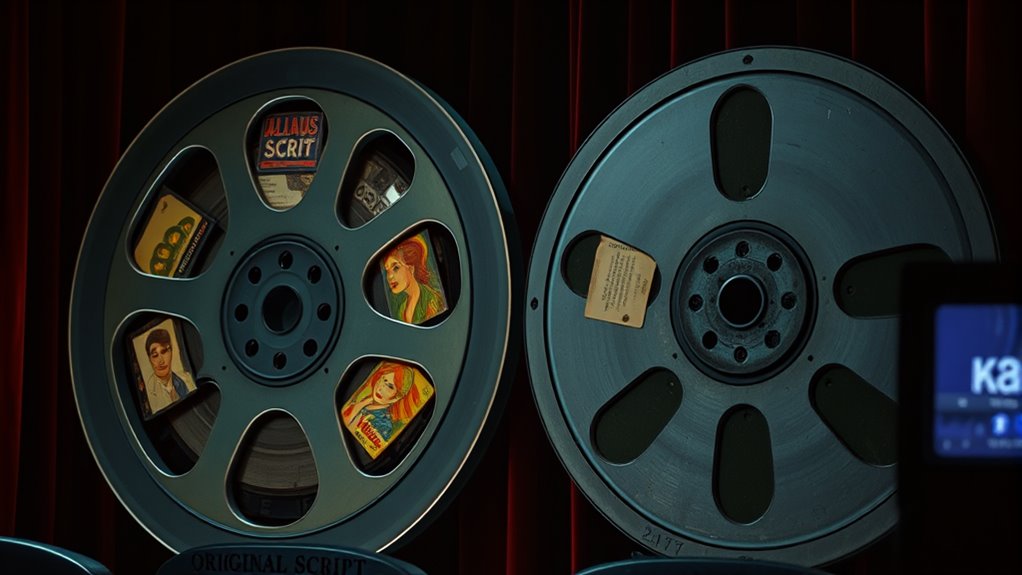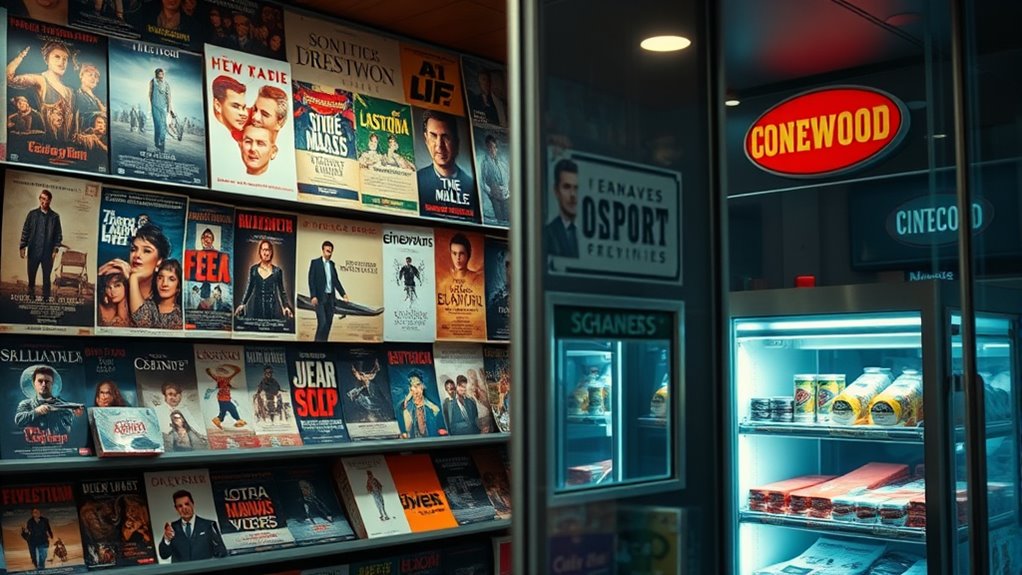Remakes dominate Hollywood because studios see them as safer bets, ensuring box office success with familiar stories and stars. This focus on reboots and sequels can hurt original scripts by diverting funding and attention away from new, innovative ideas. As a result, creative diversity suffers, and audiences may grow tired of repetitive stories. If you want to understand how these trends affect both industry innovation and cultural storytelling, there’s more to explore.
Key Takeaways
- The popularity of remakes discourages investment in original scripts, prioritizing known properties for safer box office returns.
- Industry data shows a decline in funding and production of innovative, original films due to the dominance of remakes and sequels.
- Hollywood’s focus on remakes dilutes cultural nuance and reduces narrative diversity, limiting original storytelling opportunities.
- Audience demand for familiar stories sustains remake trends, often at the expense of fresh, creative content.
- The cycle of reliance on remakes impacts industry creativity, leading to a more homogenized cinematic landscape with fewer original projects.

Have you ever wondered why Hollywood keeps revisiting old stories through remakes instead of creating entirely new scripts? The answer lies partly in the way remakes influence the cultural impact of films and their box office performance. Studios are often drawn to familiar titles because they come with built-in audiences, making them safer bets financially. When a remake hits theaters, it’s not just about retelling an old story; it’s about reigniting a cultural phenomenon that already has a legacy. These films can evoke nostalgia, attract diverse viewer groups, and generate buzz that boosts ticket sales. That’s why, from a financial standpoint, remakes often outperform original scripts initially, leading studios to favor them in their release schedules.
Remakes attract audiences and boost sales by reigniting cultural phenomena and evoking nostalgia.
However, this focus on remakes can have a stifling effect on the development of original content. When studios see proven success with familiar properties, they might be less willing to invest in fresh stories. This creates a cycle where the cultural landscape becomes saturated with remakes, reboots, and sequels, which can overshadow innovative scripts that might push creative boundaries. Over time, audiences may start to feel fatigued by the repetitive nature of Hollywood’s offerings, longing for new ideas that challenge conventions and diversify storytelling. Despite this, the box office performance of remakes often remains strong, especially when they tap into nostalgia or leverage popular stars. This financial motivation can inadvertently discourage filmmakers from pushing original scripts that might be riskier but more artistically rewarding.
Moreover, the cultural impact of remakes is complex. While they can introduce classic stories to new generations, they can also distort or dilute the original messages, sometimes leading to a loss of cultural nuance. This can diminish the richness of storytelling, reducing it to mere entertainment rather than meaningful cultural commentary. As a result, the dominance of remakes might contribute to a homogenized cinematic landscape, where originality takes a backseat to commercial viability. You might notice that Hollywood’s tendency to revisit familiar stories affects the diversity of narratives seen on screen, affecting both the industry’s creative health and the cultural fabric it aims to reflect. Additionally, reliance on AI security technologies in filmmaking processes could further influence how creative content is generated and protected in the industry.
Ultimately, the ongoing reliance on remakes is a double-edged sword. They deliver box office hits and cultural touchstones, but at the expense of fostering innovative scripts that could expand the art form. Recognizing this pattern helps you understand why the industry often chooses familiarity over originality, shaping the movies you see and the stories that define your cultural experience.
Frequently Asked Questions
How Do Remakes Impact Box Office Revenues for Original Films?
Remakes often impact box office revenues for original films by drawing on their cultural influence and nostalgia appeal. When a remake hits theaters, it can overshadow the original, diverting audiences and reducing revenue for the initial film. However, sometimes remakes boost overall interest in the franchise, benefiting both versions. Ultimately, the effect varies, but nostalgia-driven remakes tend to attract larger crowds, influencing the box office landscape profoundly.
What Demographic Prefers Remakes Over Original Scripts?
Viewer preferences tend to lean toward remakes, especially among certain demographic groups. You’ll notice that younger audiences and those nostalgic for past favorites often favor remakes, driven by familiarity and comfort. Demographic shifts show a growing appreciation for familiar stories, making remakes more appealing. As a result, these shifts influence overall movie choices, subtly shaping industry trends and highlighting how different groups respond to familiar versus original content.
Are Remakes More Profitable Than Original Movies?
You might notice that remakes often generate higher profits because they leverage existing cultural influence and familiarity. This approach appeals to audiences seeking comfort and nostalgia, boosting box office success. However, relying heavily on remakes can stifle creative innovation, limiting original storytelling. While remakes can be financially rewarding, balancing them with original scripts fosters diverse, fresh narratives that truly push the boundaries of cinema.
How Do Critics Generally Rate Remakes Versus Original Films?
They say “don’t judge a book by its cover,” but critics often rate remakes lower than original films. You’ll notice critic bias and a perceived originality decline, making remakes seem less innovative. While some remakes impress, many face harsher criticism, reflecting a preference for fresh stories. As a result, critics tend to value originality more, which influences their ratings and shapes audience perceptions of remakes versus original scripts.
What Are Producers’ Main Reasons for Choosing Remakes Over Original Stories?
Producers often choose remakes over original scripts because market saturation makes new ideas risky, and remakes tap into nostalgia appeal. You see, remakes are safer bets—they already have a built-in audience and proven success. By leveraging familiarity, producers can reduce financial uncertainty and attract viewers enthusiastic to revisit beloved stories, ensuring steady returns in a competitive entertainment landscape.
Conclusion
So, as you see, remakes can sometimes overshadow original scripts, making it harder for fresh ideas to shine. While they might bring back familiar stories, they could also be stifling creativity in the industry. If you’re passionate about original content, remember, don’t throw the baby out with the bathwater. Keep supporting new ideas, because without them, the future of storytelling might be a bit too predictable. Stay curious and keep seeking originality!









